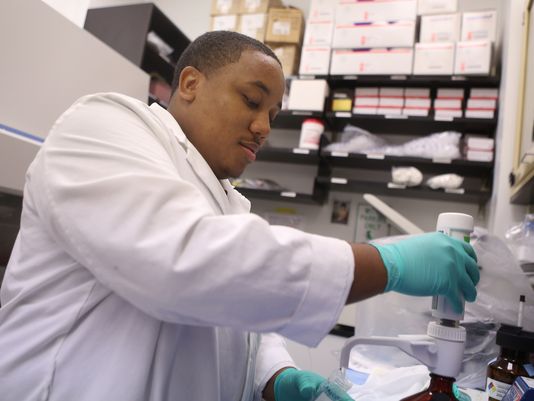A recent analysis of Cincinnati homicide data painted a portrait of a grim future for African-American men in the city, but concerned mentors are emerging who believe the key to rescuing “endangered” Black men is to introduce them to a new career path.
According to the analysis published by the Enquirer, young Black men still comprise the highest percentage of homicide victims each year.
Many Black men, especially in urban communities, have dreams of becoming star athletes or hip-hop artists.
If those dreams do not come to fruition, many get involved with selling drugs or other illegal activities.
According to Wesley Gallaher, who grew up in Cincinnati, he would have followed that same path if it weren’t for the help of great mentors in the community.
Gallaher has traded in dreams of wearing a jersey for the reality of wearing a lab coat.
He has successfully entered the medical field and works in a cancer lab at Cincinnati Children’s Hospital Medical Center – a goal he says he would have never accomplished without the Hearts and Minds Pipeline Program.
The program provided Gallaher and other minority youths in the area with mentors and other resources to help keep them out of prison.
Part of the way they do this is to expose the young men to professions in the medical field.
“A medical career was never in our scope growing up,” Gallaher said. “It was never about being a doctor or engineer. It was all about being the next LeBron (James).
Hearts and Minds puts a strong focus on building math, science and writing skills to help prepare Black males for a medical career.
In 2011, only about 2 percent of all medical school applications were from Black students, according to the Association of American Medical Colleges.
The group predicts that by the time 2025 hits, the U.S. will have a shortage of roughly 130,000 doctors of all races and backgrounds.
According to Gary Favors, the 46-year-old founder of Hearts and Minds, young Black men need to be encouraged to think beyond a recording studio or a basketball court.
“Our Black boys can do more than play athletics,” Favors said. “We have to stop pigeonholing them and start exposing them to other areas of interest.”
Favors says that young Black men will continue to be an “endangered species” if education is not made a higher priority.
According to The Urgency of Now report released by the Schott Foundation for Public Education, only 10 percent of Black males in the eighth grade can read at a proficient level and only a little more than 50 percent of Black males graduate high school in four years.
In Cincinnati, the graduation rates for Black males fell well below their white counterparts.
Donna Herrmann-Vogel, vice president of programs at Big Brothers Big Sisters of Greater Cincinnati, says those numbers are proof that communities need to act swiftly to reduce the staggering risk factor that these urban youths face.
“There has always been a huge need, but it is more urgent now,” Herrmann-Vogel said as she stressed the need for positive mentors. “It has to do with gun violence in the city and the risk factor these kids face.”

